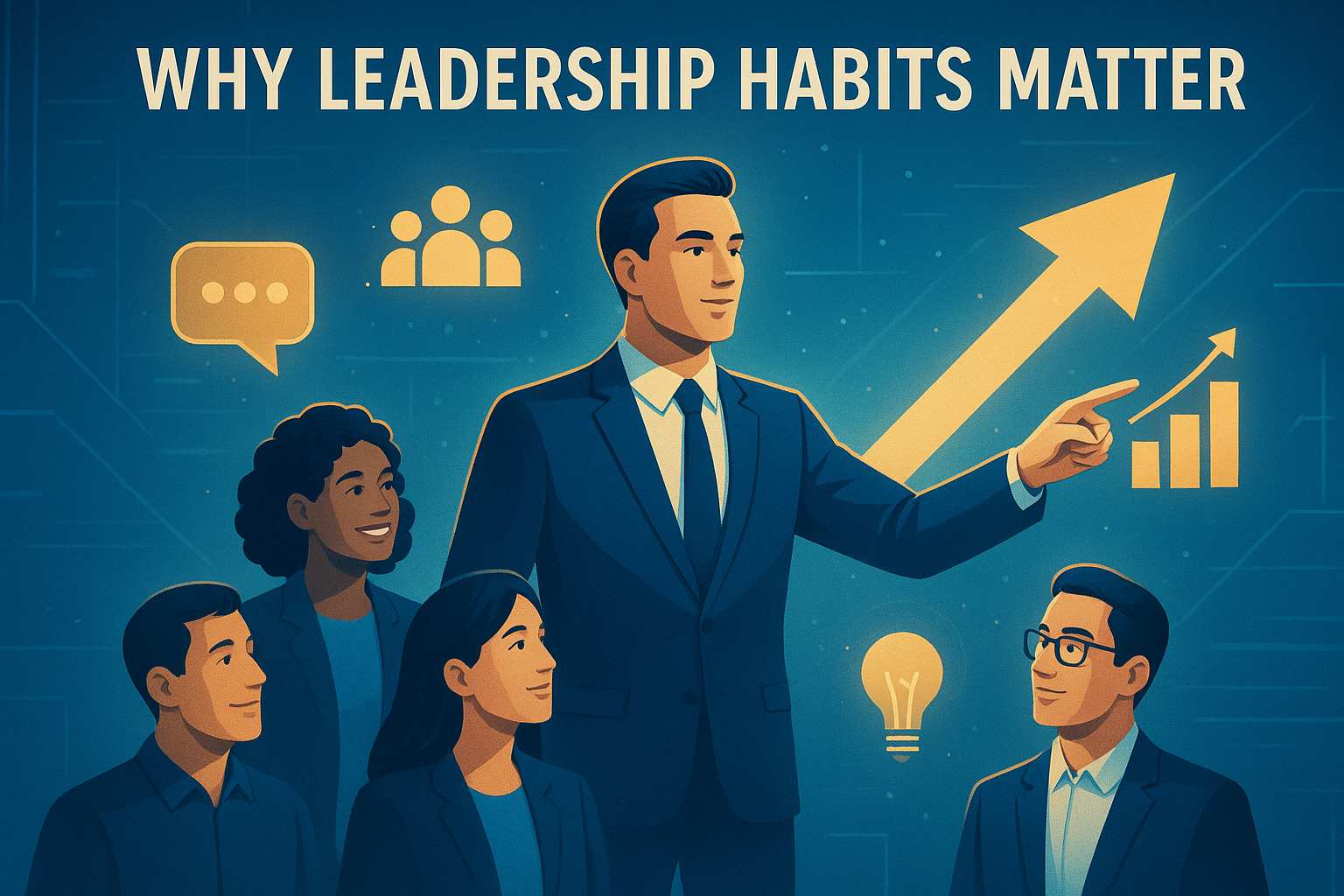Leadership is a practice, not a title, which is developed by the regular behavior. Successful leaders of the world have one thing in common effective leadership habits that push the results and motivate other people. Such habits do not only make leaders, but they make whole teams motivationally, trustfully, and high-performing.
We are going to discuss the seven habits of leadership that form engaged teams and improved results in this article. We will also examine how easy habit build up leadership, increase productivity of the management and enhance the performance of the team. Lastly, we will describe how GWork can assist leaders to transform good behavior into quantifiable outcomes.
Take the Next Step with GWork
Strong leadership starts with strong habits – and GWork helps you build them every day. Whether you want to boost management productivity, strengthen team performance, or develop the seven habits of effective leadership, GWork gives you the tools to make it happen. Start building your best leadership habits today.
Why Leadership Habits Matter
Consistency is the key aspect of great leadership, rather than the charisma, power, etc. The most effective leaders present themselves in terms of clear actions, reliable routines, and powerful habits, which are consistent with their values.
Consider the leadership habits as the success engine. These are the actions, which almost occur by default, the manner in which a leader speaks, listens, motivates, and tackles the challenge. When the habits are good, they will establish a positive atmosphere in the whole organization.
Workers are a product of what they observe. Listening is inspired by a listening leader. When a leader remains composed when facing pressure, others are influenced into remaining calm. That is the silent force of powerful leadership habits they replicate throughout a team and create performance in a natural manner.
When the leaders develop good habits in a deliberate manner, they create order, clarity and inspiration to all those around them. The result? An environment of responsibility, innovation and trust- the building block of effective teams.

The Link Between Leadership Habits and Employee Performance
All leaders have an effect on performance whether they are conscious or not. The leadership moralities that a leader does everyday can bring a team higher or slow it down.
Effective leaders have good leadership habits that ensure that they remain focused on achievement, communication is free, and they provide regular feedback. Such measures have a direct positive impact on increasing productivity in the management, that is, reducing the number of misunderstandings, eliminating delays, and help the work process.
Let’s consider two examples:
- When a leader makes frequent visits to his or her staff, he or she knows the problems ahead so eliminating bottlenecks.
- Achievement celebrator encourages the employees to continue on an upward trend.
Both examples show how leadership habits directly affect team productivity .
Inconsistency on the part of leadership behaviors also leads to uncertainty in teams. However, in a scenario where leaders can show dependable habits, employees will be safe, engaged and also motivated to give their utmost.
The relationship is direct, strong people are developed by good leadership habits. Powerful individuals develop winning teams.
The Seven Habits of Leadership That Drive Success
Success doesn’t happen overnight – it’s built one habit at a time. Below are the seven habits of effective leadership that have the greatest impact on performance and productivity.
Habit 1: Lead by Example
- Titles do not make people follow, but behavior makes them follow. Being a leader entails acting as you expect other people to act.
- Being early is sure to make your team punctual. Be honest, in case you consider it important. When you want to be excellent, demonstrate it.
- By demonstrating proper behavior, the leaders will provide an example that will elicit trust and respect. This uncomplicated practice generates credibility – and credibility is the basis of influence.
- Strong leadership habits like this create consistency across teams and ensure everyone moves toward shared goals with confidence.
Habit 2: Share lots of Communication
- Effective leadership is all about communication. Regular and open communication can be used to avoid confusion, goal alignment, and reinforcement of the relationships.
- Managers who establish open communication as a routine practice are able to work together and solve problems more quickly.
- Have time to update the team, to get feedback and to have individual conversation. Take such opportunities to listen, set the expectations, and praise progress.
- Good communication habits enhance team performance and make employees feel valued – two key drivers of engagement.
Habit 3: Power Decision-Making
- Micromanagement suppresses development. Empowerment encourages it.
- Trusting your team to make decisions is considered one of the most successful leadership habits. Empower employees with their work and allow them to innovate.
- Confidence and innovation are generated through empowerment. It also liberates leaders to concentrate on strategy rather than day to day detailing.
- When leaders trust their teams, employees feel responsible for outcomes – a powerful motivator that increases management productivity and overall performance.
Habit 4: Be an Active Listener
- Listening is not hearing words but getting the meaning.
- Active listening involves responding in a responsive way and asking clarifying questions to be able to provide an answer. Employees feel respected when they can be heard.
- Such practice enhances teamwork, minimizes misunderstanding and builds trust. It also provides leaders with the helpful information about team dynamics and possible challenges.
- This is one of the seven habits of leadership that you should implement to make sure that no voice is neglected and this will instill loyalty and motivation within the team.
Habit 5: Promote life-long Learning
- Great leaders are perpetual learners – and so they are perpetual motivators of learning.
- Invest in the development of skills, mentorship and knowledge sharing. Let your team expand at the personal and career level.
- Lifelong learning enhances flexibility and creativity. It also enhances the morale, demonstrating to the employees that their developments are of importance.
- The development of the habit in this aspect makes learning a natural aspect of work life – a key determinant of team performance in the long run.
Habit 6: Reward and Recognize Effort
- Recognition is powerful. By rewarding effort, the leaders will encourage others to work harder.
- Rewarding should become a regular leadership practice. Reward publicly and comment privately, as well as celebrate achievements as a group.
- This is an easy workout that can change the levels of motivation. It enhances confidence, decreases turnover and reinforces team spirit.
- The issue of recognition is also directly correlated with the productivity of the management – since when employees feel that they are important to the management, they can present even more energy and dedication to their jobs.
Habit 7: Reflect and Improve
- No leader is perfect. The most successful ones analyze their activities, are corrected, and continue their progress.
- Thinking establishes self awareness- an essential leadership competency. Take a moment each week and reflect on what went well, what did not and what can be improved.
- Such an attitude of betterment keeps leaders flexible and at ground level. It is also humble and accountable and promotes the same among teams.
- When one of your 7 habits of leadership becomes self-improvement, it would guarantee growth and better outcomes to all.
Habit Building for Better Leadership
The development of new habits is a deliberate, regular, and time-consuming process. Leadership is no different.
to build up good leadership habits, begin on a small scale. Select one habit to work on, such as daily check-ins or improved communication, and do it regularly. With time, such a habit will become a part of the leadership style.
The following is how habit building works:
- Set clear goals – Select what you want to work on you want to improve your listening skills, delegation, recognition.
- Start with small actions – The large transformations are initiated by small steps.
- Track progress – Assess your consistency on a weekly basis.
- Reward improvement – Recognize your personal development to be motivated.
- Get feedback – Request your team to tell you how your leadership practices are making their experience better.
The force of habit building is that it is automatic in changing behavior. Leadership excellence turns into a second nature once you engage in positive actions on a daily basis.
This is a better way of management, team performance and it is not forceful but a gradual, long lasting change.
How GWork Helps Leaders Build Better Habits
Good habits should be supported by the appropriate structure and that is where GWork comes in.
GWork is a business platform that help leaders to better their day-to-day activities, enhance the productivity of management, and enhance the performance of teams by relying on factual insights.
Here’s how GWork helps:
1. Leadership Habit Tracking
GWork enables leaders to establish and monitor their personal leadership habits. GWork is a tool that offers insight into daily performance whether it is communication objectives, the frequency of recognition, or the quality of feedback. This assists leaders to be accountable and constant.
2. Real-Time Team Feedback
The platform enables employees to be contacted easily to give feedback. This feedback loop provides the leaders with the insight as to what is working – and where they can do it better. This will eventually strengthen the good leadership practices and create a stronger bond between people in the organization.
3. Performance Analytics
The analytics dashboard of GWork tracks the development at both personal level and team level. Leaders are able to observe the performance of the team and recognize the patterns and modify the strategies rapidly. This evidence-based solution improves the productivity and decision making of the management.
4. Coaching and Learning Tools
Learning is useful in developing leaders. GWork incorporates daily habit-building programs and personalized coaching resources that assist leaders to practice the seven habits of an effective leader daily.
5. Knowledge and Engagement Technology
One of the most influential leadership habits is the habit of recognizing effort. GWork has intrinsic recognition systems that simplify and streamline appreciation. This builds morale and enhances good culture within teams.
GWork assists organizations to change habits into measurable outcomes by using technology and leadership development. It converts everyday leadership practices into success stories.
Start Building the Right Leadership Habits Today
Being a leader does not mean being perfect, it means making progress. Even the little things you develop today may have an overall effect tomorrow.
Leaders who adopt the seven habits of leadership the lead by example, communicate effectively, empowering decision making, listening, encouraging and learning, recognizing effort, and reflecting on becoming better leaders, they provide an environment in which people flourish.
Such habits not only improve the productivity of the management but also the collaboration, trust and engagement. As leaders get better, so do people.
When you are willing to make your leadership even higher, begin purposely developing these habits. And in case you need a tool to keep you up to date, measure progress and improve team performance, consider how GWork can assist you on your way.
It is the perfect teams that are created by better leaders. And all begins with improved habits.
Frequently Asked Questions (FAQs) About Leadership Habits
1. What are leadership habits?
Leadership habits refer to the habitual behavior and practices that characterize how leaders lead, motivate as well as communicate with their subordinates. Such practices as effective communication, active listening, and consistency are the factors that define the culture of a workplace. Good leadership practices foster accountability, enhance trust, and make teams work in a better way.
2. What role does the habit of leadership play in the performance of the employees?
Leadership behavior is depicted by employee performance. Employees feel important and motivated when leaders possess good leadership habits including appreciating effort or working as role models. This results in increased participation, increased concentration and improved team performance. Poor leadership habits, however, may lead to lack of consistency in leadership, and lack of motivation.
3. What are the seven habits of leadership?
The seven habits of leadership/ 7 habits of effective leadership are:
- Lead by example
- Communicate clearly
- Empower decision-making
- Practice active listening
- Promote lifelong education.
- Recognize and reward effort
- Reflect and improve
These practices foster trust, enhance communication and develop sustained success on every level of management.
4. What do I need to do to begin developing better leadership habits?
Start small. Select one of the habits such as providing feedback or listening more attentively and put it into practice every day. Consistency eventually makes things a habit. The best way to build a habit is tracking progress, setting reminders and reflecting on progress. Small steps that are continually taken lead to huge leadership changes.
5. What are the roles of leadership habits to enhance management productivity?
Good leadership traditions bring order and definition. Teams are aware of what they are expected to do and the manner in which they are supposed to perform those tasks when their leaders are clear about expectations and also take actions on what they have expected. This helps minimize delays, workflow improvement and better management productivity. The correct practices enable leaders to make superior decisions at a reduced rate, as well as maintain units at their objectives.
6. Is it possible to make good leadership habits?
Yes. Leadership is not an innate ability but it is a skill gained. Effective leadership habits can be developed by practice, feedback and self-awareness, anybody can develop them. Any leader, including the new ones, can develop the habits and habits that help to achieve better outcomes by concentrating on a single habit and being consistent.
7. What is the impact of the seven habits of leadership in the performance of a team?
The 7 habits of leadership cement the relationships, enhance the motivation level, and generate the sense of ductus. With leaders who understand how to relay messages, appreciate hard work, and promote learning, employees are motivated to perform to the best. These are good trends that enhance teamwork and ensure that high team performance is the rule rather than the exception.
8. What is the contribution of GWork to making leaders better?
GWork is an entrepreneurial platform that assists leaders to monitor and improve their leadership practices. It provides performance analysis, real time feedback devices and recognition management tools that increase management productivity and individual team performance. GWork assists in habit formation through quantifying leadership improvement and achieve organizational development through improved leadership habits.
Ready to close the strategy-execution gap?



